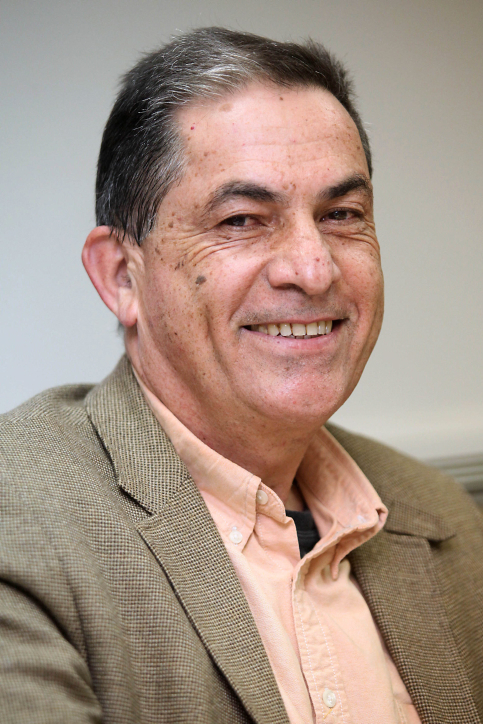Erez Tadmor reviews the latest work of the Jewish Yaroslav Hasek, Tuvia Tenenbaum.
Tuvia Tenenbom’s new book is a political nuclear bomb · The Jewish journalist who posed as a proud German succeeds where the right has failed: exposing the gap between the left’s pretense to a monopoly on enlightenment and education and the actual ignorance and bigotry they display at every opportunity · All this Tenenbom pulls off with many a wink and a nudge and a friendly smile · The Israeli left has never looked more pathetic

Review of Tuvia Tenenbom, Catch the Jew (Hebrew), Sela-Meir 2014.
Tuvia Tenenbom is a sort of Jewish Mad Hatter, possessed of a rich intellectual and cultural background and a command of German, Hebrew and Arabic. His personality is complex, perhaps even chaotic. Sometimes really weird. He’s curious as a cat, sly as a fox, friendly as a Labrador and with the sensitivity of a seismograph. He’s a bohemian with a chauvinist sense of humor, disdainful of political correctness and attentive to his fellow man. On an ideological level, he’s an atheist, liberal, humanist, and to a certain extent cosmopolitan. In practice, he likes beautiful women, good food and alley cats.
In short, Tenenbom is the ultimate leftist and a true humanist—the kind who like flesh and blood humans who he comes in contact with, not just humanity in the abstract. From a wounded Syrian in a hospital where Tenenbom is the only one interested in his well being, to children in Jenin who fantasize about German women, to the Bedouin woman who pours out her heart about her husband marrying a second wife and all the way to Jibril Rajoub—”the most charismatic of men”—who became his friend for a bit. Tuvia Tenenbom is everything the left pretends to be.
In the past year, Tenenbom has been on a whirlwind journey among innumerable people, organizations, and places in the Land of Israel. Eric Asherman, Gideon Levy, Jibril Rajoub, Merav Michaeli, Ayelet Shaked, Amos Shocken, members of the Red Cross and innumerable European organizations, representatives of German funds and Israeli cinema funds, Bedouin from al-Araqib, settlers from Hevron and the Shomron, Hasidim of Rav Batzri and the court of Ushpitzin (the town of Auschwitz). The result is a clever and funny psychedelic and literary admixture which only a Jewish intellectual-journalist with a razor sharp wit and a clever disguise (as a proud German journalist) could expose.
The result? In one word: boom. In two words: atom bomb. In more words: the Israeli left has never looked more pathetic. The tension between the persona of Tenenbom, and the Israeli and European leftists as they reveal themselves when meeting with Tubi, the German journalist, is the source of the book’s power.
On one side of this book. is Tubi, the ultimate leftist, a humanist sensitive to others. On the other are Palestinians, whom Tubi successfully gets to express extreme Jew hatred and admiration for Germany. In the third corner are leftists who run the gamut from complete detachment from reality to anti-semitism and self-hatred. Both these last are fueled by European money, primarily German money, with a single goal: to “catch the Jew”: to provide the world with their pound of evil Jewish flesh which will clear their consciences and return the Jew to where he belongs—the dock.

Palestinian lovers who know no Palestinians and human rights activists who deny the Holocaust
When Tenenbom meets Gideon Levy, he hears two interesting anecdotes from him. It turns out that Levy does not speak Arabic and that his “investigations” are entirely dependent on claims he can neither verify nor confront. It also turns out that after decades of pro-Palestinian advocacy, Levy doesn’t have a single Palestinian friend. Tenenbom gets Levy to promise that he’ll be invited to his next trip to Palestine but throughout the book he hears all sorts of evasions and technical excuses from Levy.
Tenenbom goes out himself to find testimony of Israeli crimes in occupied Palestine. He meets with senior Palestinian officials, hearing of their desire to wipe out Israel. As a German journalist, he also makes friends with ‘Atef Abu el-Rub, the B’tselem researcher who also helps Levy’s own investigations. “You support the Jews. You paid them money,” Abu-Rub tell Tenenbom via a translator. “But ask him if he remembers that we also killed them,” Tubi tells the translator (since Tubi ostensibly does not speak Arabic). The response of the researcher for B’tselem and Gideon Levy says, laughing: “That’s a lie, I don’t believe it.”

At dinner with a known intellectual couple whose names Tenenbom preferred not to reveal, they tell him that their home was renovated by an Arab contractor, at the end of which he planted an olive tree in their garden. When they thanked him, he replied: “You don’t have to thank me, I did it for myself and my family. Soon you will leave this house…soon this country will be free of Jews.”
The couple takes pride in that they don’t let their personal experiences affect their positions. “It doesn’t matter if what I believe in is factually true. I know it’s not true, but I don’t care about facts! I want to believe even if what I believe is a lie.” Tuvia looks at the wife and after a long silence she agrees to admit that she and her husband are stupid. According to her, her husband is not willing to admit this. At the end of their meeting, the husband recommends Tuvia read the articles of Gideon Levy.
When Tenenbom hears of an international human rights tournament about to take place in al-Quds University, he rushes over only to discover that such a tournament didn’t exist, and wasn’t even planned. But the international funding for the tournament was both planned and sent.
The book is filled with dozens if not hundreds of similar stories. The Palestinians—as anyone who is not willingly blind already knows—are exposed for who they are. The foreign media and organizations are exposed as the penultimate naifs who will buy into any anti-Israel libel no matter how absurd and how easy to disprove. Meanwhile, leftists are exposed as those who run from complete blindness to no less complete self-hatred.
When Tenenbom has dinner with a group of left-wing academics, he hears from one of them: “I’m a liberal, super liberal. And I’m an atheist.” According to her, she specializes in religious extremism, and in addition she’s an expert in Judaism which she categorizes as a “pagan religion.” “Can you please tell me what ‘Isaiah’s vision’ is?” Tuvia asks, leaving the intellectual and Judaism specialist speechless. The others at the table come to her aid and say all sorts of big words. The question remains unanswered.
The anger of the peacemakers
Tenenbom’s book succeeds where the right has often failed. He exposes the chasm between the left’s ostensible monopoly on humanism, enlightenment, education and tolerance and the actual racism and ignorance they display at every opportunity. But Tenenbom does it with a smile, wink, and with much love and mercy, even for the most miserable of libels. It’s no wonder that he raises the left’s ire to such a degree that Alona Kimhi has called for him to be killed or the attempt of Rabbi Eric Asherman and crew to bust up the event launching the book in Tel Aviv. Tubby Tuvia kills ’em with kindness.
English translation by Avi Woolf.
To receive updates on new articles in English, join Mida on Facebook or Twitter or join our mailing list.



